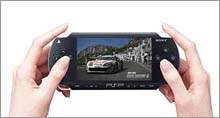 |
| Sony's PSP will go on sale March 24. |
|
|
|
NEW YORK (CNN/Money) -
The delayed battle between Sony and Nintendo for dominance of the North American handheld gaming market now has a firm kickoff date. Sony Thursday announced the PSP (PlayStation Portable) would hit U.S. retail shelves on March 24.
The system will carry a price tag of $249.99 and come bundled with several accessories, including a 32MB memory stick, AC adaptor and a copy of the feature film "Spider-Man 2". The company did not announce plans to sell the PSP as a standalone device at this time.
"One of the things we've always strived to do was position this as a new portable entertainment device that obviously plays games, but has so much more to offer," said Kaz Hirai, president and CEO of Sony Computer Entertainment America.
"We didn't want it to be seen as a competitor to the other handheld gaming devices in the market. We wanted to offer consumers a completely new world, as we did with PlayStation and PlayStation 2. So we looked at what would be the right value proposition to consumers in North America and decided including all these accessories... plus the demo disk and [the ability] to enjoy 'Spider-Man' out of the box was the best value proposition."
Sony plans to ship 1 million units to North America by March 31, which is higher than many analysts expected -- and twice as high as initial shipments in Japan, which received the PSP last December.
The PSP is Sony's first entry to the handheld gaming space, which Nintendo has dominated for 16 years. The machine has roughly the same graphical quality as the PlayStation 2 and is being targeted at an older audience than other handheld gaming machines, with Sony particularly eyeing 18-to-34-year-old males.
Sony will face stiff competition from Nintendo's Game Boy and recently released Nintendo DS. The DS was a huge hit for the company in the 2004 holiday season, with nearly 3 million units sold in less than two months. Nintendo recently raised its sales expectations for the DS from 5 million to 6 million.
But momentum appears to be dying for the DS. January came and went without a significant release for the system. And Nintendo conceded last month that software sales were weak, lowering its forecast from 15 million units to 10 million.
The PSP, meanwhile, has been building on the buzz it started last year. Some anxious gamers shelled out more than $400 to import the system from Japan. And Sony's decision to ship a feature film with the first million units should underline the fact that the system does more than play games.
Hirai downplayed the competition with Nintendo, hinting the company's focus was more centered on devices such as Apple's iPod.
"What we're up against are the consumer entertainment options overall," he said. "The competition is for mind share and timeshare when people are on the go."
At launch, the PSP will allow owners to watch films, view digital photos and listen to digital music. Currently, "Spider-Man 2" is the only film that has been confirmed for the product's launch. Hirai said Sony is currently finishing up discussions with other studios and expects to announce the PSP's motion picture line-up closer to launch.
Sony (Research) initially planned to release the PSP in the U.S. in late 2004, but opted to postpone the launch, saying it wanted to ensure there was "a reasonable amount of software titles to launch with hardware."
It seems to have achieved that goal. The company said 24 PSP games will launch in the first four weeks of availability. At present, it does not know how many will be available on day one.
"It's hard to tell at this point in time," said Hirai. "Even at our first-party studios we're putting the finishing touches on the games. I'd rather delay a game by a week or two then rush stuff out there."
PSP titles will typically retail for $39.99, though smaller titles will likely cost a bit less, which raises the question: Since the two systems are so similar in game graphics and performance, could the lower price of PSP games cannibalize sales of higher prices PS2 games?
Hirai doesn't believe so.
"That's going to really depend on the software application," he said. "There's talk now in our internal studios that you'd want to buy both [versions]...where, for example, you're playing a particular game at home, say 'SOCOM' and you clear certain levels, then you transport that data to your PSP, then play some when you're out and transport that progress back to your PS2. It would be a seamlessly integrated portable and full console game. ...I think there's the potential to double revenue."
Morris is Director of Content Development for CNN/Money. Click here to send him an e-mail.

|